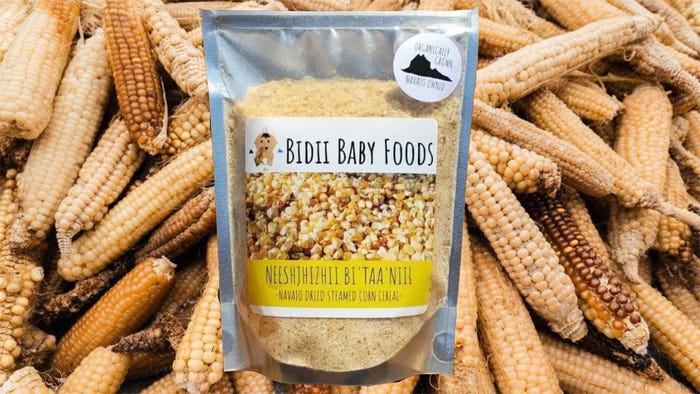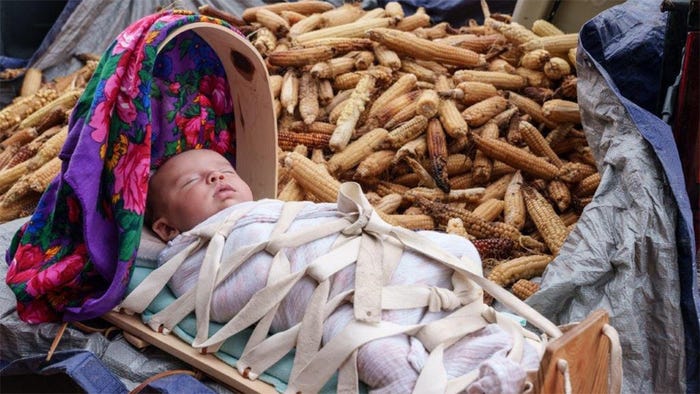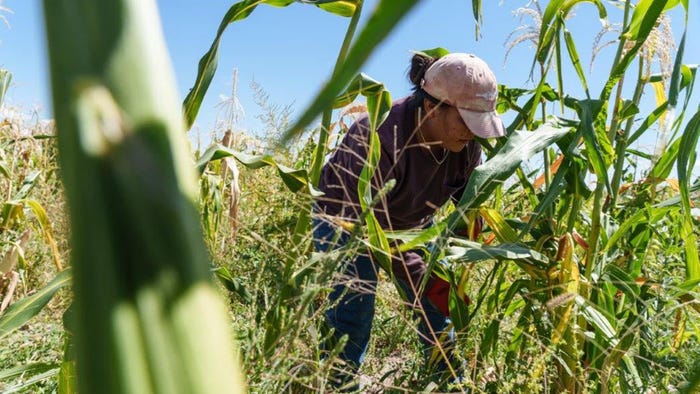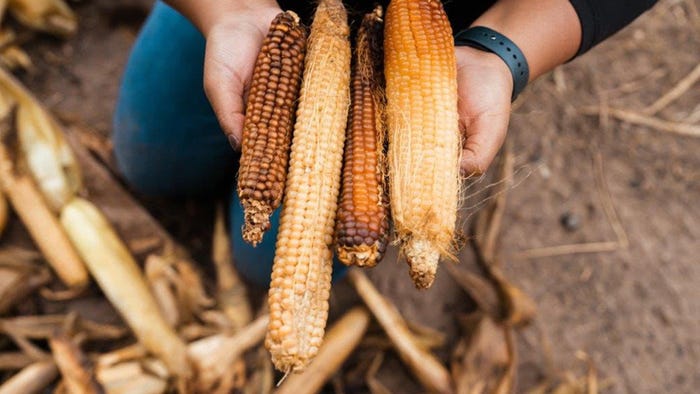Bidii Baby Foods gives Navajo children food they ‘are yearning for’
Co-owner Zach Ben shares the company’s vision for a recent $75,000 endowment and overcoming difficulties of living on a reservation. Read about the Navajos' challenges.
April 8, 2024

Bidii Baby Foods, this year’s Greg Steltenpohl Pragmatic Visionary Award winner, brings regenerately farmed, ancestral Indigenous sustenance for little ones to the table—and, soon, so much more.
Now, with $75,000 more in hand thanks to the award, Bidii Baby Foods co-owner Zach Ben intends to put the money to immediate use for the benefit of his Diné community, or people of the Navajo Nation.
“Rather than saying, ‘Oh, we’ve got money in our savings now and we're going to hang on to it,’ no, there are things that we need to work on now and this is how we're doing it,” Ben says.
The initiatives to which he’s referring come as part of a five-year business plan. They begin with perhaps one of the most challenging so far: building housing on Bidii Baby Foods’ land to host the participants in its Farmer-in-REZidence program. That’s a tough one, because Bidii Baby Foods must navigate all kinds of bureaucracy to obtain the permits that will allow it to start construction on Navajo land.

Credit: Bidii Baby Foods
Ben also wants to install a commercial kitchen so Bidii Baby Foods can continue manufacturing. There is no such facility on the Navajo Nation; getting permission for one will require getting past more red tape.
On top of that, Bidii Baby Foods needs to work with Navajo Nation authorities to implement policies so the young farmers in the REZidence project may become incorporated food producers. That will take funding. Along the way, Bidii Baby Foods will allocate portions of that $75,000 to increase crop yields through healthy soil initiatives. From there, the company will expand into agritourism, too, inviting visitors to disconnect from technology and reconnect with the earth.

Credit: Bidii Baby Foods
‘Our children are sick’
All of those goals stem from a singular vision: to give the children (and yes, adults, too) of the Navajo Nation the food of their ancestors: not government-distributed processed cheese, not canned meats, not sugar-filled canned fruit, but heritage maize, squash, beans, melons, amaranth grain and more.
In Navajo, “bidii” means someone who has a strong appetite or who is frequently filling their stomach, as Bidii Baby Foods notes on its website. About 25% of Navajo Nation families do not have electricity, so they cannot store perishable foods. The closest access to fresh groceries lies 50 miles in one direction. Trader Joe’s and Whole Foods are hours away—and outright unaffordable for people with a median income of $20,000, Ben says.
As a result, many people on the Navajo reservation eat those processed, commodity foods. Children, especially, feel constant craving for real sustenance while the community experiences the highest rates of Type 2 diabetes in the country, Ben says.
Bidii Baby Foods has set out to shift that reality through Zach’s expertise as a sixth-generation Navajo farmer and his wife Mary’s specialization in public health. They started Bidii Baby Foods in 2021 after having their first child and realizing through new parents’ eyes how few healthy, nourishing, ancestral foods are available to young Navajo people.
“Our target demographic is this area right now,” Ben says. “That's why we're not looking to immediately go nationwide, because our children are sick. Our children don't have that access to healthy foods. So, what do we do?”
The answer, he says, is to grow crops exclusively from Indigenous heritage seeds that serve as the basis for cereals, grits and even creamer for mom and dad’s morning coffee. From there, Bidii Baby Foods is working to distribute its products to preschools, daycare centers, food banks and other institutions where Navajo children eat. It’s also seeking a place as a Women, Infant and Children (WIC) vendor to reach even more young Diné.
“What we create in terms of products is conscious toward what our children are yearning for,” Ben says. “The innate parts of themselves get to enjoy those first foods because that's what their ancestors ate. That's what their diet prefers. That's how they'll be able to break down these nutrients and extract the most out of them. They're using our own natural resources.”

Credit: Bidii Baby Foods
Overcoming trauma to reclaim ancestral independence
For Ben, Bidii Baby Foods represents an extremely personal mission: not only to provide filling Indigenous foods to the reservation’s children, but also to teach as many under-30 Navajo citizens as possible to reduce reliance on the federal government so they may gain and pass down ancestral knowledge and economic sustainability.
“This is the way that we can do it so our children can inherit the wealth that we're building now, rather than inheriting the historical intergenerational trauma that was inflicted upon past generations,” Ben says.
That goal comes with its own complications and nuances. Attaining it calls for helping Farmer-in-REZidence participants to overcome a litany of traumas, from sexual, physical and mental abuse to addiction and domestic violence. Ben himself says he has been exposed to all the adverse childhood experiences that lead to toxic stress and perpetuate the trauma cycle.
“I'm not going to romanticize reservation life,” he says. “It's horrible.”
In Ben’s case, it took moving off the Navajo Nation and finding a partner who offered “a safe space for me to thrive, not survive” and become the person who could return to the reservation and serve his community through Bidii Baby Foods and its nonprofit offshoot, The BEN Initiative.
“Once I had that moment to realize and move out of that survival mentality, then I could meet her halfway and say, ‘You're right, let's work on some change. Let's break some bad habits that were created with trauma. Let's create a better future,’” he said.
The Bens take that to heart through Bidii Baby Foods and the BEN Initiative. Farmer-in-REZidence comes to the fore here. It’s the outlet through which Bidii Baby Foods teaches young people how to earn a living as farmers on the Navajo Nation; shares expensive, heavy equipment in a co-op model; learns how to request grants; and more. Oftentimes, however, it’s first necessary to address the most pressing obstacle: trauma.
Most of the time, the participants “are still stuck in reservation life,” Ben says. As such, without alternatives, they have to go back home “after a wonderful day of farming” and face upheaval.
“We romanticize that it takes a community to raise our children, but it can also take a community to also hurt our children,” Ben says.
Bidii Baby Foods and the BEN Initiative aim to change that by giving Farmers-in-REZidence a safe place to live while learning their craft; hence, the use of some of the Steltenpohl Award proceeds for on-site housing. For now, the Bens take an hour every morning to ask how the students are doing after the previous night of being at home again, and to offer suggestions for growth and change.
“This is how we're improving [things], one step after one foot after the other,” Ben says.

Credit: Bidii Baby Foods
Indigenous farming is regenerative agriculture
Another of the Bens’ goals is tied to making the most of the Navajo Nation’s farming land. The Shiprock area alone, where Bidii Baby Foods is located, features 12,000 acres designated for farming. Yet only 10% of that land is being used, with less than 2% grown for food, Ben says. Plus, most Navajo farmers have aged into their sixties and beyond. The reservation has a critical need to nurture its young people and teach them to deliver day-to-day nutrition, not just ceremonial foods, to their community.
Combining resources to farm different acreage through Farmer-in-REZidence will expand Bidii Baby Foods’ output, as well as that of the farmers joining in the company’s non-profit’s efforts.
“Our limit is about 40 acres,” Ben says. “We’ve resided on our plot for three years now. We’re only about 15 acres in so we have access to 40, but we're still on 15 and every year we're going to expand those acreages.
“There’s only so much we can produce. With that increasing demand as well, that's where our young farmers will come into play. They can do five acres here, they can do five acres there, 10 acres over there. Then we have a combined 60 acres or so. And that's where we can continue to meet that demand through the supply of traditional crops, not through the supply of commercialized crops. That’s how this really plays to a sustainable, secure, economic agricultural future,” he continued.
Indeed, that approach speaks to the wider American population that has grown aware of the life-threatening dangers of depleted topsoil, and the deep damage incurred by pesticides and weed killers. Now, long-practiced Indigenous approaches are attracting Western attention.
“I laugh because that's regenerative agriculture,” Ben says. “Speaking as an agriculturalist, we’ve seen [that] starting to become trendy now, which is not a bad thing. I'm glad that people are finally understanding and starting to finally take care of [the land].”
Even so, Ben acknowledges the irony within the trendiness.
“We’re breaking Manifest Destiny,” he says of American Indians. “This [Indigenous] culture that’s becoming rebranded into this American thing is something colonists are good at, but it’s something we’re appreciative of because we're being recognized finally. It's a really good shift and it's going to take continuous education and working together. I think we're on a good path. So, let's continue on that path.”
Indeed, Ben does not want to focus on cultural division as he and Mary seek to elevate their community beyond trauma and oppression.
“In our creation stories, all five-fingered people walk between Mother Earth and Father Sky. It doesn't say the brown folks from the Four Corners region. It doesn't say the brown folks that harvest corn and all that. No, it just says, biologically, we're five-fingered people. And so, when you take a look at yourself and you take a look at others, we all have five fingers,” Ben says.
“We are those beings that walk on two legs, not four legs, not crawling. We walk on two legs and so those beings work together. So, what works for us as the Diné people and works for people on the other side of the world [is] because we're all part of Mother Nature in that sense. So, let’s work together rather than working against each other. Because nature will ultimately show us as she has done so before.”
Read more about:
RegenerativeAbout the Author(s)
You May Also Like




